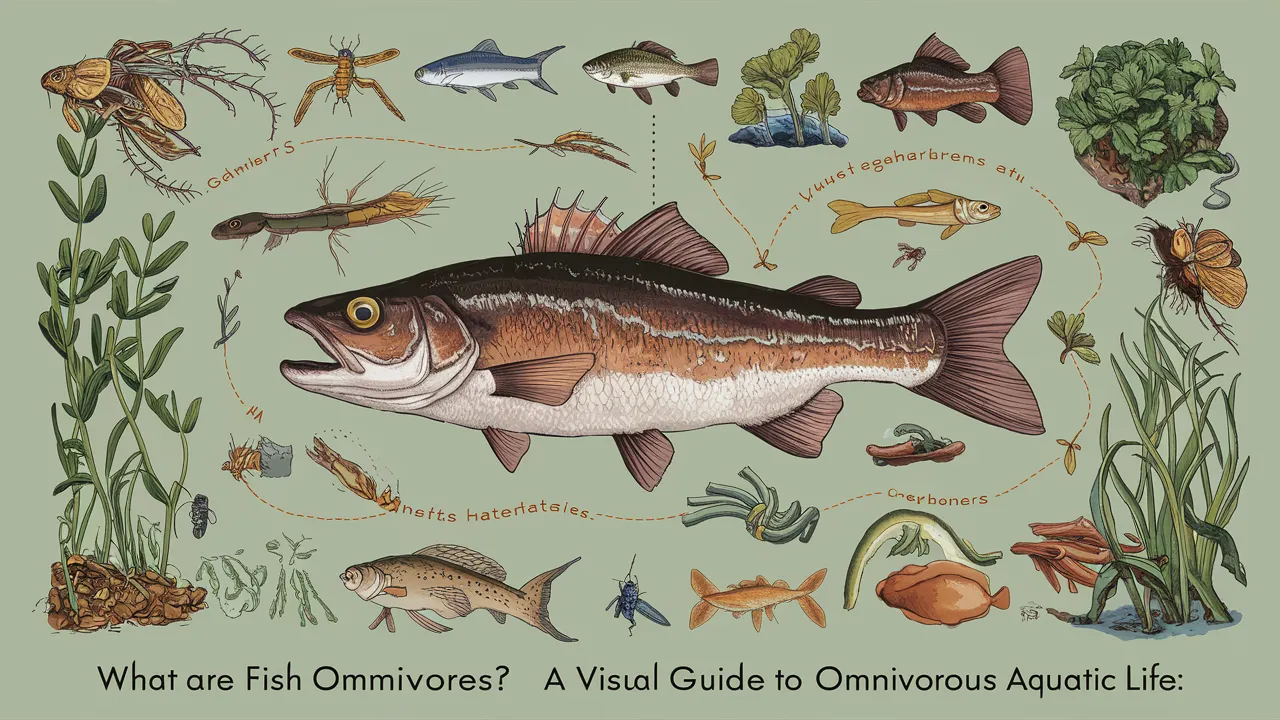Fish are fascinating creatures, and understanding their dietary needs is crucial for their proper care and well-being. One of the key questions that often arises is whether fish are omnivores, meaning they consume both plant and animal matter. In this article of Betta Fish Tips, we’ll explore the topic of fish omnivores and provide valuable insights for fish enthusiasts.

What Are Fish Omnivores?
An omnivore is an organism that eats food from both plant and animal sources. Omnivores have a diverse diet and can obtain the necessary nutrients from a variety of food sources. This dietary flexibility allows them to thrive in different environments and adapt to changing food availability.
Are All Fish Omnivores?
No, not all fish are omnivores. Fish can be classified into several dietary categories, including:
Carnivores
Carnivorous fish primarily consume other animals, such as smaller fish, crustaceans, or insects.
Herbivores
Herbivorous fish primarily feed on aquatic plants, algae, and other plant matter.
Omnivores
Omnivorous fish consume both plant and animal matter, making them more versatile in their dietary preferences.
Common Omnivorous Fish Species
Many popular freshwater and saltwater fish species are considered omnivores. Some examples include:
Freshwater Omnivores
- Bettas (Siamese Fighting Fish)
- Guppies
- Mollies
- Platys
Saltwater Omnivores
- Clownfish
- Damselfishes
- Angelfish
- Tangs
These omnivorous fish species can adapt to a range of food sources, making them well-suited for various aquarium environments.
Importance of Proper Nutrition for Omnivorous Fish
Providing a balanced diet is crucial for the health and well-being of omnivorous fish. A diet that includes a variety of plant-based and animal-based foods can help ensure that the fish receive all the necessary nutrients, such as proteins, carbohydrates, vitamins, and minerals.
Feeding a diverse range of high-quality fish foods, including flakes, pellets, frozen or freeze-dried foods, and occasional live or fresh foods, can help meet the dietary needs of omnivorous fish species.
What are some common mistakes when feeding omnivorous fish?
- Overfeeding: Feeding fish too much food, either in quantity or frequency, can lead to health issues like obesity, digestive problems, and water quality degradation.
- Lack of variety: Omnivorous fish require a balanced diet with a mix of plant-based and protein-based foods. Feeding the same type of food all the time can lead to nutritional deficiencies.
- Improper food size: Providing food that is too large for the fish’s mouth can cause choking or digestive issues. Ensure the food size is appropriate for the fish’s size.
- Inappropriate food types: Some fish may be sensitive to certain ingredients, such as high-protein or high-fat foods. Feeding the wrong types of food can cause digestive problems or other health issues.
- Poor water quality: Uneaten food and fish waste can quickly deteriorate water quality, leading to stress and health problems for the fish. Maintaining good water quality is crucial when feeding omnivorous fish.
- Inconsistent feeding schedule: Omnivorous fish do best with a consistent feeding schedule, rather than sporadic or random feeding times. This helps regulate their metabolism and digestion.
- Lack of plant matter: Omnivorous fish require a significant portion of their diet to be plant-based, such as algae, vegetables, or specially formulated plant-based fish foods. Neglecting this can lead to nutritional deficiencies.
By avoiding these common mistakes and providing a balanced, appropriate diet, you can help ensure the health and well-being of your omnivorous fish.
How often should I feed my omnivorous fish each week?
The frequency of feeding for omnivorous fish can vary depending on several factors, but here are some general guidelines:
- Adult fish: Feed adult omnivorous fish 2-3 times per day, with each feeding being just enough for the fish to consume within a few minutes.
- Juvenile/growing fish: Juvenile or growing omnivorous fish may require more frequent feedings, such as 3-4 times per day, to meet their higher metabolic needs.
- Small fish: Smaller omnivorous fish species may need to be fed 4-5 times per day, as they have faster metabolisms and smaller stomachs.
- Large fish: Larger omnivorous fish, such as cichlids or koi, may only need to be fed 1-2 times per day, as they can consume larger portions at a time.
- Fasting days: It’s generally recommended to provide one or two fasting days per week, where no food is given. This allows the fish’s digestive system to rest and helps maintain healthy water quality.
The exact feeding schedule should also take into account factors like water temperature, activity levels, and the type of omnivorous fish you’re keeping. As a general rule, it’s better to underfeed slightly than to overfeed, as uneaten food can quickly degrade water quality.
Observe your fish’s behavior and body condition to determine if the current feeding schedule is appropriate. Adjust the frequency and portion sizes as needed to maintain a healthy, balanced diet for your omnivorous fish.
Conclusion
In conclusion, while not all fish are omnivores, many popular fish species do fall into this dietary category. Understanding the feeding habits and nutritional needs of omnivorous fish is essential for their proper care and maintenance in aquarium settings. By providing a well-rounded diet, fish enthusiasts can help ensure the long-term health and thriving of their omnivorous fish.

Bài viết liên quan
Introduction To Betta Fish Species
Betta fish, also known as Siamese fighting fish, are a popular choice among aquarium enthusiasts [...]
Jul
Understanding Types Of Neocaridina Shrimp
Neocaridina shrimp are a captivating group of freshwater crustaceans that have become increasingly popular among [...]
Jul
Understanding Fancy Goldfish Types
Goldfish, with their vibrant colors and graceful movements, have captivated the hearts of aquarium enthusiasts [...]
Jul